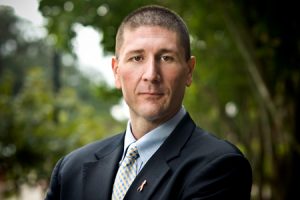 David L. Albright, Hill Crest Foundation Endowed Chair in Mental Health and professor, has been appointed by the National Academies of Sciences, Engineering, and Medicine to the Committee on the Well-being of Military Families.
David L. Albright, Hill Crest Foundation Endowed Chair in Mental Health and professor, has been appointed by the National Academies of Sciences, Engineering, and Medicine to the Committee on the Well-being of Military Families.
The National Academies of Sciences, Engineering, and Medicine convened the committee to study the challenges and opportunities facing military families and what is known about effective strategies for supporting and protecting military children and families and lessons to be learned from these experiences. The committee reviews available data and research on military children and families, including those who have left the military, with attention to differences by race, ethnicity, and other factors.
Other committee members are:
- Kenneth W. Kizer, M.D., M.P.H., a distinguished professor and director of the Institute for Population Health Improvement (IPHI) at the University of California, Davis
- Stephen J. Cozza, M.D., professor of Psychiatry at the Uniformed Services University where he serves as associate director, Center for the Study of Traumatic Stress
- Ellen DeVoe, MSW, Ph.D., is professor and director of the Doctorate Program at the Boston University School of Social Work
- Abigail Gewirtz, Ph.D., is the John and Nancy Lindahl Leadership Professor in the Department of Family Social Science and the Institute of Child Development, and director of the Institute for Translational Research in Children’s Mental Health at the University of Minnesota
The committee also reviews related literature on childhood resilience and adversity. Specific topics may include:
- What can be learned from the positive experiences military families have and the protection conferred on them through supports provided by the Department of Defense and service branches, with attention to specific interventions that have been effective and how they might be used at broader scales and in non-military contexts.
- How the challenges presented by military life, such as frequent moves, exposure to trauma, and economic and other stresses to parents, influence children’s social-emotional, physical, biochemical, and psychological development, and how those effects may vary across racial, ethnic, and other characteristics.
- The mechanisms by which resilience can be fostered in military children and families, with attention to the broader literatures on human development, stress exposure, and resilience, as well as available research from other countries.
- What is needed to strengthen the support system for military families, with attention to consistency of the current system of services and resources across population subgroups, service branches, and military status (including families who have left the military).
Members of the committee will serve two years, the project period.